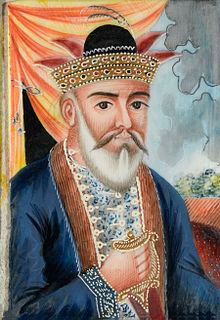Dost Mohammed
Dost Mohammed (born December 23, 1793 in Kandahar , † June 9, 1863 in Herat ) was ruler of Afghanistan from 1826 to 1840 and from 1843 until his death . He was the founder of the Baraksai dynasty.
Life
Afghanistan has been ruled by the Durrani dynasty since 1747 . After Dost Mohammed's older brother Fateh Khan, vizier of the then king or Shah , was murdered in 1826, a rebellion broke out. The Durranis were overthrown. Long-term disputes broke out over the successor. In 1826 Dost Mohammed was able to establish himself as ruler.
The eastern region of influence, Peshawar , was now lost to the Punjab and western Herat to the Durranis. Dost Mohammad, thus only ruler of the central part of Afghanistan, initially took the title of Khan instead of the Shah title of the previous rulers . It was not until 1834, after he had thwarted the attempt of the former ruler Shodja Shah Durrani to recapture the throne, that he accepted the title of Emir .
From 1835 there was a rapprochement with Russia , which led to a conflict with British supremacy, the so-called Great Game . This situation was exacerbated in the conflict over Peshawar. The ruler of Punjab Ranjit Singh enjoyed the British confidence and was unwilling to give up his claims. In this situation, the British Governor General of Calcutta , Baron Auckland , wrote a harsh letter to Dost Mohammed asking him to give up his claims to Peshawar and his rapprochement with Russia. Since the latter did not meet the demands, Lord Auckland decided to overthrow Dost Mohammed with the Shimla Manifesto of October 1, 1838 and reinstate the former ruler Shodja Shah Durrani. In order to emphasize this demand, around 16,500 British and Indian troops and around 35,000 servants and family members marched over the Bolan Pass into Afghanistan under the command of General Keane . The First Anglo-Afghan War broke out . On July 30, 1839, the British army marched into Kabul and took the city without a fight. Dost Mohammed withdrew to the Hindu Kush . In November 1840 he surrendered to the British. The resident William Macnaghten sent him to the Indian exile .
In the course of the next year the unrest against Shodja Shah Durrani and the British troops increased. The arrival of Mohammed Akbar , a son of Dost Mohammed, with 6,000 men in Kabul worsened the situation. Eventually General Elphinstone's disastrous retreat took place , in which his army was completely destroyed. In response, the British marched again into Kabul. On October 11, 1842, troops from Kabul and, subsequently, Afghanistan withdrew completely to India after the British East India Company concluded that the continued occupation was too risky and costly. After the British withdrew from the country, Dost Mohammed was able to return to his throne. In the following years he succeeded in regaining control over large parts of Afghanistan that had previously been lost. In 1855 and 1857 Dost Mohammed signed friendship treaties with the British.
In 1863 his army succeeded in taking Herat, where Dost Mohammed died a few days later. He was succeeded on the throne by his son Shir Ali and later by his son Mohammed Afzal Khan .
literature
- William Dalrymple : Return of a King. The Battle for Afghanistan. Bloomsbury, London a. a. 2013, ISBN 978-1-408-82287-6 .
- Jules Stewart: On Afghanistan's Plains. The Story of Britain's Afghan Wars. IB Tauris. London / New York 2011 ISBN 978-1-84885-717-9 .
Web links
- Dost Mohammed . In: Ehsan Yarshater (Ed.): Encyclopædia Iranica (English, including references)
| personal data | |
|---|---|
| SURNAME | Dost Mohammed |
| BRIEF DESCRIPTION | Ruler of Afghanistan |
| DATE OF BIRTH | December 23, 1793 |
| PLACE OF BIRTH | Kandahar |
| DATE OF DEATH | June 9, 1863 |
| Place of death | Herat |
